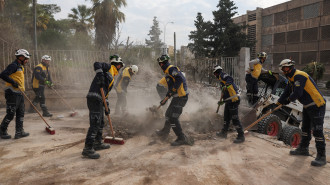Breadcrumb
Crisis, leadership, and the Middle East: Inside Joe Biden’s presidency and the Gaza war in Bob Woodward’s War
"[Israeli] Hostages were the emotional spine for most leaders, especially Biden. Getting the hostages back safely would be a victory, failure to do so could permanently stain a presidency," so goes Bob Woodward’s new book War.
War deals with the tumultuous and turbulent years under America’s 46th President Joe Biden, beginning with his ascent to office with President Trump refusing to acknowledge the 2020 election loss, traversing the catastrophic withdrawal of US and NATO forces from Afghanistan, Russia’s invasion of Ukraine and Israel’s war on Gaza.
Just invoking the name Bob Woodward conjures up an image of an investigative journalist for his coverage of the Watergate scandal. A premiere reporter at the Washington Post who has authored 14 books and covered every US president since Richard Nixon, his books on the inner workings of the most powerful office in the world have become somewhat of a tradition in the best-sellers market.
Probably no one has done more to provide an intimate and nuanced portrait of US administrations and insights into what the president and senior officials are thinking as Woodward has.
While both Joe Biden and Donald Trump declined to be interviewed for the book, Woodward commends Biden’s team for being more open to talking to him and sharing information compared with previous teams: "I believe President Biden and this team will be largely studied in history as an example of steady and purposeful leadership," he writes in the book.
US officials portrayed the way they wish to be seen
Reading War I can’t help but feel that it portrays US officials the way they wish to be seen, which is hard-working and good-faith actors trying to do their best to enhance national security and peace.
How accurate this image is will be up to the individual reader, but I have my own scepticism towards this depiction, especially when it comes to the Middle East.
While the book does not mention the word genocide and the court case against Israel in the International Court of Justice for its actions in Gaza, nor US threats to punish the International Criminal Court over pending indictments of Israeli Prime Minister Benjamin Netanyahu and former Defence Minister Yoav Gallant, nonetheless it certainly feels like concerns about genocide and war crimes charges are on the minds of US officials in their recounting of events.
Multiple accounts of the US pressuring Israel to spare the civilian population of Gaza and feeling uncomfortable by Israel’s actions are found throughout the book.
For example, US Secretary of State Anthony Blinken met with Yoav Gallant two days after he declared a total siege of the Gaza Strip and Blinken supposedly felt "a chill to his core" after Gallant told him it did not matter how many Palestinian civilians died Gaza so long as Hamas was eliminated: "Jesus, Blinken thought, that’s the headspace the Israelis were in."
Doubting intelligence
You do at times get the impression that US officials are at times suspicious of the intelligence Israel gives them.
Shortly after the Hamas attack on 7 October 2023, Israel was looking to begin a war against Hezbollah in Lebanon, which according to War the US was opposed to; Netanyahu’s senior adviser Ron Dermer told the US that Hezbollah drones had crossed the Israeli border and that in 30 minutes Israel would carry out a full strike on Lebanon.
Dermer told Washington they had good intelligence on this, but when the Americans went to quickly corroborate this, they found no evidence of a Hezbollah drone and the claim seemed to be based on a rumour from social media.
US National Security Council adviser Brett McGurk is quoted as saying: "The Israelis always do this… They claim ‘We got the intel! You’ll see it. You’ll see it.’ But like 50 percent of the time the so-called intel doesn’t actually show up."
Israel would later backtrack on this claim and issued an official statement debunking the Hezbollah drone report. War does depict an Israel that was gung-ho about attacking Lebanon not long after 7 October.
A thrilling and intriguing read
Arab leaders, with the exception of Qatar, seem to want the same thing. Hamas destroyed, but with protection for Gazan civilians due to concerns over popular pressure within their own countries.
A few Arab leaders told Blinken that they had warned Israel about Hamas; Saudi Crown Prince Mohammad bin Salman [MBS] also told Blinken there needed to be a clear pathway to a Palestinian state, it is not a question of it he wanted it, he needed there to be one in exchange for normalisation between Israel and Saudi Arabia.
The book does not deal adequately with the constant breakdowns in ceasefire negotiations and return of the hostages, specifically how Netanyahu would often derail them as we know from a recent leak from within the Israeli government. However, the central role played by Qatar in getting ceasefires and hostages out is fleshed out well.
All in all, War is an interesting, thrilling and intriguing read, but its omission of crucial details with regard to the Middle East means it has missed out on a crucial part of the story.
Usman Butt is a multimedia television researcher, filmmaker and writer based in London who read International Relations and Arabic Language at the University of Westminster and completed a Master of Arts in Palestine Studies at the University of Exeter






![Anthony Blinken speech [Getty] Anthony Blinken speech [Getty]](/sites/default/files/styles/image_684x385/public/media/images/6263436E-8ACD-4D3C-9055-25A7BE79DD5A.jpg?h=d1cb525d&itok=fLHmHCRG)
 Follow the Middle East's top stories in English at The New Arab on Google News
Follow the Middle East's top stories in English at The New Arab on Google News


